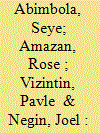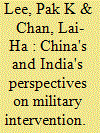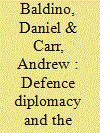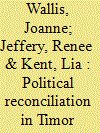|
|
|
Sort Order |
|
|
|
Items / Page
|
|
|
|
|
|
|
| Srl | Item |
| 1 |
ID:
143916


|
|
|
|
|
| Summary/Abstract |
International scholarships for higher education are a large component of foreign aid in many high-income countries, including Australia. The aims for Australian scholarships awarded to African students are to achieve development in Africa and advance the influence of Australia. However, well-articulated theories of change that define how scholarships are linked to these and other outcomes are not available in the literature. In order to address this gap, the authors explore the perspectives of Australian-funded Master's-level alumni from Kenya, Uganda and Mozambique on the implementation process before, during and after their scholarship award, and the outcomes of the scholarships. The authors found that Australian scholarships to Africans have the potential to spread Australian influence, and that returnee scholars, by virtue of their study in Australia, gain the capacity to become agents for development in their country. The process of choosing scholarship awardees, the local circumstances in each country on return, and support and mentoring networks after return can influence the achievement of these outcomes. Investments in international scholarships should be directed to develop additional skills and facilitate networks in order to further prepare the returnee scholars to influence development in their country and perpetuate Australian influence.
|
|
|
|
|
|
|
|
|
|
|
|
|
|
|
|
| 2 |
ID:
143923


|
|
|
|
|
| Summary/Abstract |
This article addresses the puzzle for students of international relations as to why China and India, two major re-emerging powers in Asia, do not always baulk at military intervention invoked by Chapter VII of the United Nations Charter, while they rhetorically harbour strong reservations about it. The recent cases of Côte d'Ivoire (2011), Libya (2011), Syria (since 2011) and Mali (since 2012) show that both China and India acquiesced in external military intervention in these African countries plunged into brutal civil wars, with only intervention in Syria being rebuffed. By studying how they voted in the United Nations Security Council in 2011–12 and their discourses on intervention, including humanitarian intervention, this article examines why their decisions about intervention in Africa diverged from their decisions regarding intervention in Syria. The authors put forward the thesis that their behaviour can be explained by an interplay between norms and interests, in which they express a common anti-US liberal imperialist stance, shaped by a ‘collective historical trauma' and ‘post-imperial ideology', and demonstrate concerns for state failure and preferences for regional initiatives and political mediation to resolve civil wars.
|
|
|
|
|
|
|
|
|
|
|
|
|
|
|
|
| 3 |
ID:
143920


|
|
|
|
|
| Summary/Abstract |
The practice of military-to-military engagement has been strongly embraced in the last few decades as a central tool for strategic management. Many governments in the Asia-Pacific, including Australia, have accepted the practice as an instrument of statecraft to achieve comprehensive strategic outcomes: as a means of defusing tensions, reducing hostility and shaping the behaviour of states towards each other. This article examines Australia's broad approach and practice, and argues that such transformative ambitions are overstated. The evidence suggests that the benefits from defence diplomacy are evident at the tactical and operational level. It is a mode to deal with precise and immediate security issues, as opposed to the moulding of major strategic settings. This indicates the need to better recognise the limitations and conceptual flaws of defence diplomacy, and to reformulate Australian defence channels and related engagement prescriptions towards a more cautious, pragmatic and ultimately security-related stance. Through the use of case-study analysis, this research identifies both opportunities and constraints in conducting defence diplomacy, while offering guidelines for its future implementation in the region.
|
|
|
|
|
|
|
|
|
|
|
|
|
|
|
|
| 4 |
ID:
143921


|
|
|
|
|
| Summary/Abstract |
In recent years, the study and practice of political reconciliation has experienced a turn to hybridity. This turn has been defined by the increased rate at which liberal international and local peacebuilding practices, and their underlying ideas, have become merged, integrated or co-located in time and space. While hybrid approaches to reconciliation have been praised as an effective means of engaging local populations in peacebuilding operations, little attention has been paid to examining whether or not they also bring unintended negative consequences. Drawing on the cases of Timor Leste, Solomon Islands and Bougainville, this article examines the potentially dark side of hybridity. It demonstrates that, in each of these cases, hybrid approaches to political reconciliation have brought both positive and negative consequences. On the positive side of the equation, hybridity has seen imported international approaches to reconciliation adapted to meet local demands and ensure resonance with local populations. On the negative side, however, the misappropriation and instrumentalisation of local practices within hybrid approaches has served to damage their legitimacy and to jeopardise their contributions to reconciliation. The article thus concludes that the existence and extent of this dark side necessitates a re-evaluation of how hybrid approaches to political reconciliation are planned and implemented.
|
|
|
|
|
|
|
|
|
|
|
|
|
|
|
|
| 5 |
ID:
143918


|
|
|
|
|
| Summary/Abstract |
With the rise of Islamic State of Iraq and Syria (ISIS), the issue of domestic radicalisation has taken on renewed significance for Western democracies. In particular, attention has been drawn to the potency of ISIS engagement on social media platforms like Twitter and Facebook. Several governments have emphasised the importance of online programs aimed at undermining ISIS recruitment, including the use of state-run accounts on a variety of social media platforms to respond directly to ISIS messaging. This article assesses the viability of online counter-radicalisation by examining the effectiveness of similar programs at the US State Department over the last decade. The article argues that governments attempting to counter online radicalisation of their domestic populations must take seriously the significant shortcomings of these State Department programs. The most relevant issue in this regard is the recurring problem of credibility, when the authenticity of government information is undercut by the realities of foreign policy practice, and existing perceptions of hypocrisy and duplicity are reinforced in target audiences.
|
|
|
|
|
|
|
|
|
|
|
|
|
|
|
|
|
|
|
|
|